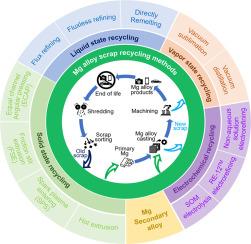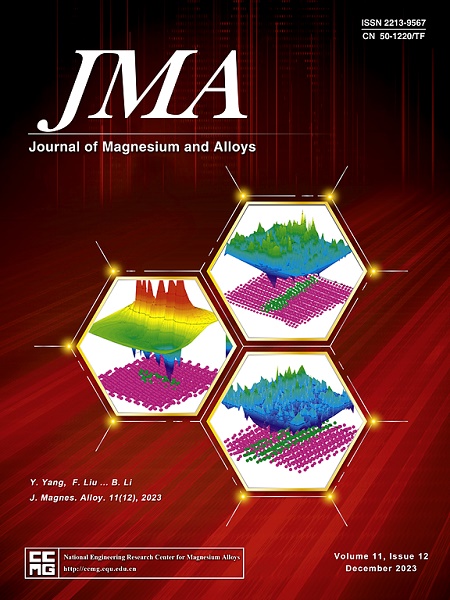Progress and prospects in magnesium alloy scrap recycling
IF 15.8
1区 材料科学
Q1 METALLURGY & METALLURGICAL ENGINEERING
引用次数: 0
Abstract
Magnesium (Mg) alloy is widely used in aerospace and automotive industries as an excellent lightweight metal material to reduce carbon emissions. The expansion of Mg alloy applications and the increasing demands for these materials have significantly facilitated the generation of Mg alloy scrap. The recycling of Mg resources is crucial for promoting both environmental sustainability and economic viability. However, current recycling effect is unsatisfactory. Therefore, this paper provides a comprehensive review of the entire recycling process, including scrap classification, separation and sorting, pre-treatment, and recycling. This paper explores the generation of Mg alloy scrap and its reincorporation into industrial products. This review outlines various Mg scrap recycling technologies based on different phase states. These include liquid-state recycling (such as flux refining, impurity removal additives, fluxless refining, compound treatment, and direct remelting), solid-state recycling (involving hot extrusion, equal-channel angular pressing (ECAP), friction stir extrusion (FSE), and spark plasma sintering (SPS)), vapor-state recycling (comprising vacuum distillation and sublimation), electrochemical recycling (solid oxide membrane (SOM) electrolysis, RE-12™ electrorefining, and non-aqueous solution electrorefining), and Mg secondary alloy development. The advantages and existing challenges associated with each method are compared and discussed, and the current obstacles to the future recycling of complex scrap are examined.


镁合金废料回收利用研究进展与展望
镁(Mg)合金作为一种优良的轻质金属材料,广泛应用于航空航天和汽车工业,以减少碳排放。镁合金应用的扩大和对镁合金材料需求的增加,极大地促进了镁合金废料的产生。镁资源的循环利用对促进环境可持续性和经济可行性都至关重要。然而,目前的回收效果并不理想。因此,本文提供了一个全面的回顾整个回收过程,包括废料分类,分离和分类,预处理和回收。本文探讨了镁合金废料的产生及其在工业产品中的再利用。本文综述了基于不同相态的各种废镁回收技术。其中包括液态回收(如助熔剂精炼、除杂质添加剂、无助熔剂精炼、复合处理和直接重熔)、固态回收(包括热挤压、等通道角挤压(ECAP)、搅拌摩擦挤压(FSE)和火花等离子烧结(SPS))、蒸汽态回收(包括真空蒸馏和升华)、电化学回收(固体氧化膜(SOM)电解、RE-12™电精炼、和非水溶液电精炼),以及Mg二次合金的发展。对每种方法的优点和存在的挑战进行了比较和讨论,并对未来复杂废料回收的当前障碍进行了研究。
本文章由计算机程序翻译,如有差异,请以英文原文为准。
求助全文
约1分钟内获得全文
求助全文
来源期刊

Journal of Magnesium and Alloys
Engineering-Mechanics of Materials
CiteScore
20.20
自引率
14.80%
发文量
52
审稿时长
59 days
期刊介绍:
The Journal of Magnesium and Alloys serves as a global platform for both theoretical and experimental studies in magnesium science and engineering. It welcomes submissions investigating various scientific and engineering factors impacting the metallurgy, processing, microstructure, properties, and applications of magnesium and alloys. The journal covers all aspects of magnesium and alloy research, including raw materials, alloy casting, extrusion and deformation, corrosion and surface treatment, joining and machining, simulation and modeling, microstructure evolution and mechanical properties, new alloy development, magnesium-based composites, bio-materials and energy materials, applications, and recycling.
 求助内容:
求助内容: 应助结果提醒方式:
应助结果提醒方式:


